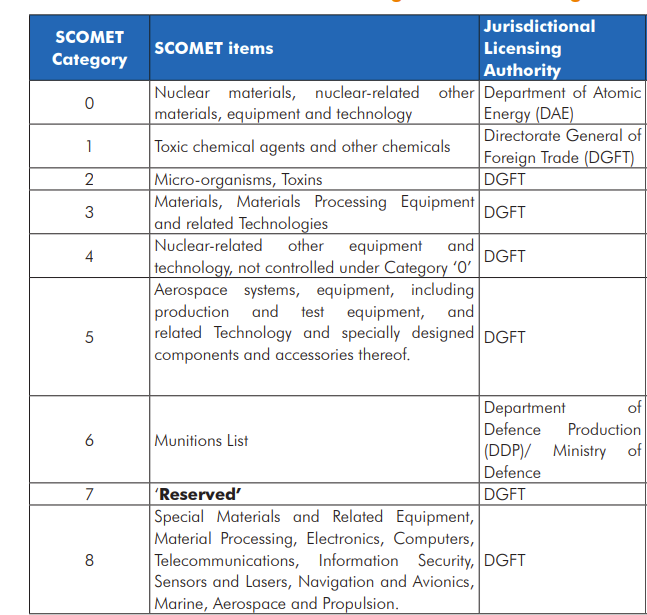Understanding SCOMET: India’s Dual-Use Export Control Framework-GENERAL OVERVIEW
Introduction:
Special Chemicals, Organisms, Materials, Equipment, and Technologies (SCOMET) constitute a crucial aspect of India’s export control regulations, primarily focusing on dual-use items with potential applications in both civilian and military contexts. This comprehensive framework, aligned with international export control regimes and conventions, aims to strike a delicate balance between promoting technological advancements and preventing the proliferation of weapons of mass destruction.
Overview of SCOMET List:
The SCOMET List, serving as India’s National Export Control List, is an essential tool in regulating the export of dual-use items, including software and technologies. The list is categorized from Category 0 to Category 8, with Category 7 currently marked as ‘Reserved.’ This classification corresponds with the control lists of multilateral export control regimes, ensuring a harmonized approach.
Key Components of SCOMET List
- Special Chemical: This category includes chemicals that have applications in various industries but also possess properties that can be used for chemical weapons or military purposes.
- Organisms: Biological agents and organisms fall under this category. It encompasses living entities that may have application in medical , agricultural, or industrial fields but may also pose a threat in the context of biological weapons or bioterrorism.
- Material: Materials that can be utilised in both civilian and military applications are covered under SCOMET.
- Equipment: Various types of equipment that could have application in strategic fields. This may encompass machinery, devices or systems with potential dual -use capabilities.
- Technologies: The technological aspects of SCOMET involves knowledge and information that can be applied in diverse sectors. Technologies with applications in research, development and manufacturing but with the potential for military and WMD use are included.
Validity of SCOMET Authorisations
| Sr. No | Authorisation Type | Validity |
| 1. | Fresh Export | 2 years |
| 2. | General Authorisation for intra company transfer (GAICT) | 3 years |
| 3. | General Authorisation for export of chemicals (GAEC) | 5 years |
| 4. | General Authorisation for export of Drones (GAED) | 3 years |
| 5. | General Authorisation for export after repairs in India (GAER) | 1 years |
SCOMET WHEN GOODS SUPPLIED BY DTA TO EOU/SEZ
Export authorization is generally required for SCOMET items, except for supplies from Domestic Tariff Area (DTA) to Special Economic Zones (SEZ) or Export-oriented Units (EOU). However, any physical export of SCOMET items from SEZ/EOU to another country necessitates export authorization from the Directorate General of Foreign Trade (DGFT) headquarters. Revalidation of such authorizations is possible for up to 12 months.
Imported Goods and SCOMET List:
Goods covered under the SCOMET list, even those stored in Customs bonded warehouses, cannot be exported without proper authorization, unless exempted. If an item not explicitly listed in SCOMET is deemed to pose a potential risk related to Weapons of Mass Destruction (WMD) or military use, the exporter is required to apply for a SCOMET authorization following specified procedures.
Record-Keeping and Validity:
SCOMET export authorization holders are mandated to maintain relevant records, including application documents, for a minimum of five years or until the validity of the export authorization expires. The authorization itself is typically valid for 24 months unless stated otherwise.
Repeat Orders and SCOMET Authorization:
For repeat orders of the same SCOMET items to the same country/entities, exporters must submit applications through the prescribed proforma [ANF 10A] via the online SCOMET portal, along with supporting documents.
Conclusion:
India’s SCOMET framework plays a pivotal role in balancing the promotion of technological advancements with the imperative to curb the proliferation of weapons of mass destruction. This dual-use export control mechanism reflects the nation’s commitment to international non-proliferation efforts while facilitating responsible trade and technological collaboration.
To Know more click here




